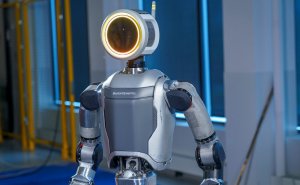Anything You Can Do, Robots Can Do Better: Infographic
![]() The matter of human vs. machine is a long-standing conundrum, as we’re brilliant enough to create machines that are efficient at what they’re designed to do, but self-aware enough to recognize the long-term implications of replacing human labor with machines. Thee’s a balance to be met, and situations like this can drive major industry shifts that affect the job market, education and everything in between.
The matter of human vs. machine is a long-standing conundrum, as we’re brilliant enough to create machines that are efficient at what they’re designed to do, but self-aware enough to recognize the long-term implications of replacing human labor with machines. Thee’s a balance to be met, and situations like this can drive major industry shifts that affect the job market, education and everything in between.
As data becomes a conquered task for machines, computers are better able to aid in decision-making processes, research and other areas of amassed knowledge. Machine work isn’t just for labor-intensive jobs anymore. It raises a very serious question of what the future will look like, especially as social and economic structures learn to rely more on human power in order to bring out the true potential of the robot worker.
You’re a good employee with an excellent working attitude, and you always get the job done. One day, you receive a memo from your boss saying you’re fired. You wonder, “How can this be? I didn’t think do anything wrong.” You look outside and realize that robotics is on the rise. It’s just that robots can do a better job.
There are careers that are easily replaceable by automatons. Machines are not only fast– they are efficient, cost-effective and accurate. Factories that used to patronize human labor to do the heavy lifting are now using machines that are operated by people you can count on two hands. That’s going to save companies like LEGO a great deal, enabling them to pass on the cost savings through their products.
Robots are also good for doing tedious tasks, such checking out at a grocery store (self-checkout, anyone?). All you have to do is maintain the machine. They’re cheap and they don’t have the urge to steal cash from the tender box.
If robots were ever to take over in the work force, millions of people around the world could lose their jobs. Most likely to go to the robots next are retail clerks, paralegals, armed forces, medical, drivers, pharmacists and customer service representatives.
Performance and output aside, there’s also the issue of safety. If you put a robot in the front line during a war, it’s going to be just like playing World of Warcraft, except that you’re playing it with another country and there are serious international matters at stake. At least there are no human lives imperiled, yeah?
A message from John Furrier, co-founder of SiliconANGLE:
Your vote of support is important to us and it helps us keep the content FREE.
One click below supports our mission to provide free, deep, and relevant content.
Join our community on YouTube
Join the community that includes more than 15,000 #CubeAlumni experts, including Amazon.com CEO Andy Jassy, Dell Technologies founder and CEO Michael Dell, Intel CEO Pat Gelsinger, and many more luminaries and experts.
THANK YOU













